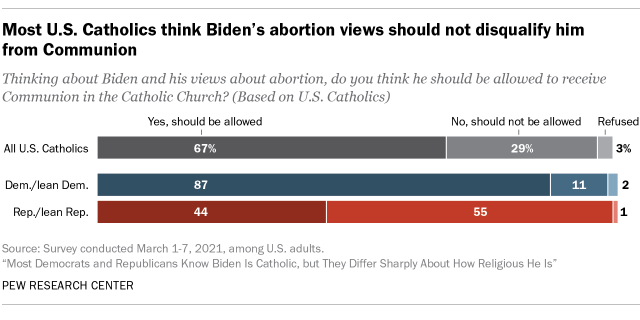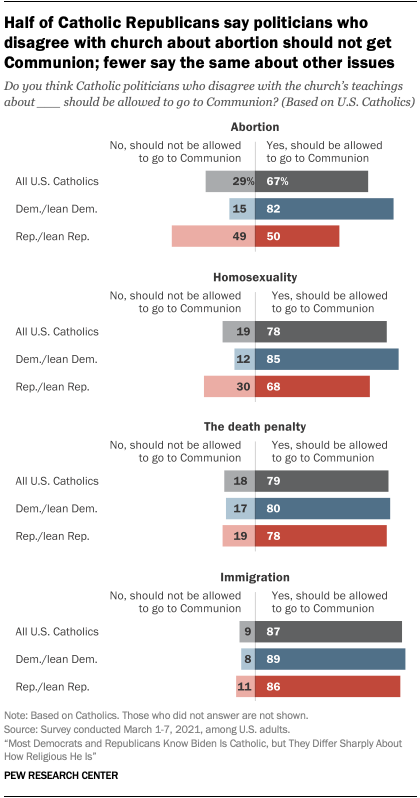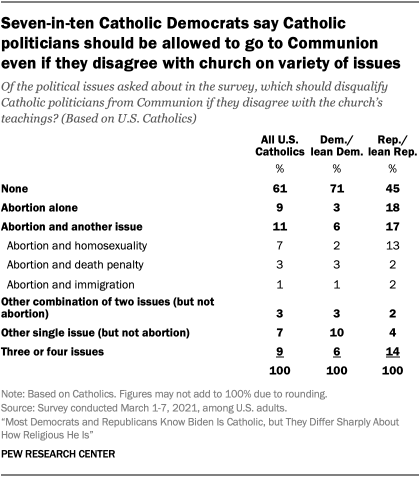President Joe Biden’s support of abortion rights has prompted some Catholic clergy to argue that he should be denied Holy Communion. And while the majority of U.S. Catholics disagree, their opinions are sharply divided along party lines, according to a new Pew Research Center survey.
Among U.S. Catholic adults overall, 67% say Biden should be allowed to receive Communion during Mass, while 29% say the country’s second Catholic president should not be allowed to do this. However, among Catholics who identify with or lean toward the Republican Party, a slim majority (55%) say Biden’s abortion stance should disqualify him from receiving Communion, compared with just 11% of Catholic Democrats and Democratic leaners who say the same.

Pew Research Center conducted this survey to explore Catholic attitudes about whether Catholic politicians – including Joe Biden – should be barred from receiving Communion if they disagree with the Catholic Church’s teachings about a variety of political issues.
The Center surveyed 12,055 U.S. adults (including 2,492 Catholics) from March 1 to 7, 2021. All respondents are part of the Center’s American Trends Panel (ATP), an online survey panel that is recruited through national random sampling of residential addresses. This way nearly all U.S. adults have a chance of selection. The survey is weighted to be representative of the U.S. adult population by gender, race, ethnicity, partisan affiliation, education, religious affiliation and other categories. For more, see the ATP’s methodology and the methodology for this report.
Here are the questions used in this report, along with responses.
Communion, also known as the Eucharist, is one of seven Catholic sacraments; others include baptism, confession and marriage. The Catechism of the Catholic Church calls the Eucharist “the source and summit of the Christian life,” and the church teaches that when the bread and wine of the Eucharist are consecrated by an ordained priest, they, “by the words of Christ and the invocation of the Holy Spirit, become Christ’s Body and Blood.”
Note: For the latest data on abortion, read our 2022 report, “America’s Abortion Quandary.”
The Catholic Church teaches that Christians “with whom we are not yet fully united” and Catholics who are “conscious of grave sin” should not receive Communion. The church also teaches that “every procured abortion” is a “moral evil.” Biden has said he supports Roe v. Wade, the 1973 Supreme Court decision that established a woman’s right to an abortion. This tension, while not new, has intensified since Biden became president, and a committee of U.S. bishops may produce a document on the issue.

Public figures’ eligibility for Communion has long been debated in the United States, and the new survey also asked respondents a general question about whether Catholic politicians whose positions conflict with the church’s teachings about four particular issues – abortion, homosexuality, the death penalty and immigration – should be allowed to receive Communion.
Among U.S. Catholics overall, 29% say that Catholic political figures who disagree with the church about abortion should be disqualified from the Eucharist. Fewer say this should be the case for politicians whose positions conflict with the church over homosexuality (19%) or the death penalty (18%), and just 9% say this about Catholic politicians who don’t align with the church’s teachings on immigration.
The church opposes the death penalty; Pope Francis recently revised a section of the Catechism to say that capital punishment is “inadmissible because it is an attack on the inviolability and dignity of the person.” On immigration, the church teaches that people have a right to migrate to sustain their lives, and that while countries have a right to control their borders, the “more prosperous nations are obliged, to the extent they are able, to welcome the foreigner in search of the security and the means of livelihood which he cannot find in his country of origin.” The church also opposes same-sex marriage, and while the Catechism says that people who have “homosexual tendencies … must be accepted with respect, compassion, and sensitivity,” it also says that “homosexual acts are intrinsically disordered.”
On abortion and homosexuality, two issues on which Catholic teaching might be described as “conservative” within the U.S. political context, the survey again reveals sharp partisan divides. Roughly half of Catholic Republicans (49%) say politicians who support legal abortion should not be able to receive Communion, while just 15% of Catholic Democrats agree. And three-in-ten Catholic Republicans say politicians should be barred from Communion if their positions conflict with the church’s teachings on homosexuality, compared with just 12% of Catholic Democrats.
But when it comes to the death penalty and immigration – where Catholic teaching is more “liberal” on the political spectrum – Republican and Democratic Catholics are largely united around the idea that politicians who disagree with the church’s teaching should not be disqualified from receiving Communion.
On some of these questions, there are differences in views by frequency of Mass attendance. For example, U.S. Catholics who attend Mass at least weekly are more likely than those who attend less often to say Biden’s views about abortion should disqualify him from receiving the Eucharist (40% vs. 25%), and that politicians in general who support abortion rights should be disqualified from doing so (42% vs. 24%). Weekly Mass attenders also are more inclined than other Catholics to say that politicians who disagree with the church over homosexuality (27% vs. 16%) and the death penalty (22% vs. 15%) should be barred from the Eucharist. There is no such gap when it comes to immigration.

Overall, seven-in-ten Catholic Democrats believe that Catholic politicians who disagree with the church about any of the four issues raised by the survey should still be allowed to receive Communion.
By contrast, most Republicans think it should be disqualifying if a Catholic politician disagrees with the church on at least one of these issues. This includes 18% of Catholic Republicans who think abortion is the sole issue that should be a litmus test for receiving Communion, along with 17% of Republicans who name both abortion and one other issue (usually homosexuality). An additional 14% of Catholic Republicans say that three or four of these issues should be grounds for disqualifying Catholic politicians from receiving Communion in the event of a disagreement with the church.
Note: Here are the questions used in this report, along with responses, and its methodology.



